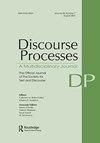与叙事人物的接触:社会认知能力和语言观点的作用
IF 2.1
2区 心理学
Q2 PSYCHOLOGY, EDUCATIONAL
引用次数: 0
摘要
摘要本文探讨了文本和读者特征在角色参与体验中的作用。在一项在线研究中,参与者完成了一些社会认知能力的自我报告和行为测量,并阅读了两篇文学叙事,其中语言观点标记的存在使用高度控制的操作策略进行了改变。之后,参与者报告了他们的角色参与体验。对参与者反应的主成分分析揭示了角色投入的多维性,其中包括自我和他人导向的情绪反应(如同理心、个人痛苦)以及更多的认知反应(如认同、观点采纳)。此外,角色参与被发现依赖于广泛的社会认知能力,而不是观点标记的存在。最后,也是最重要的一点,我们没有找到令人信服的证据来证明社会认知能力和观点标记之间存在相互作用。这些发现表明,读者更依赖于他们的社会认知能力来接触虚构人物的内心世界,而不是文本提供的这些内心世界的词汇线索。本文章由计算机程序翻译,如有差异,请以英文原文为准。
Engagement with narrative characters: the role of social-cognitive abilities and linguistic viewpoint
ABSTRACT This article explores the role of text and reader characteristics in character engagement experiences. In an online study, participants completed several self-report and behavioral measures of social-cognitive abilities and read two literary narratives in which the presence of linguistic viewpoint markers was varied using a highly controlled manipulation strategy. Afterward, participants reported on their character engagement experiences. A principal component analysis on participants’ responses revealed the multidimensional nature of character engagement, which included both self- and other-oriented emotional responses (e.g., empathy, personal distress) as well as more cognitive responses (e.g., identification, perspective taking). Furthermore, character engagement was found to rely on a wide range of social-cognitive abilities but not on the presence of viewpoint markers. Finally, and most importantly, we did not find convincing evidence for an interplay between social-cognitive abilities and the presence of viewpoint markers. These findings suggest that readers rely on their social-cognitive abilities to engage with the inner worlds of fictional others, more so than on the lexical cues of those inner worlds provided by the text.
求助全文
通过发布文献求助,成功后即可免费获取论文全文。
去求助
来源期刊

Discourse Processes
Multiple-
CiteScore
4.30
自引率
4.50%
发文量
27
期刊介绍:
Discourse Processes is a multidisciplinary journal providing a forum for cross-fertilization of ideas from diverse disciplines sharing a common interest in discourse--prose comprehension and recall, dialogue analysis, text grammar construction, computer simulation of natural language, cross-cultural comparisons of communicative competence, or related topics. The problems posed by multisentence contexts and the methods required to investigate them, although not always unique to discourse, are sufficiently distinct so as to require an organized mode of scientific interaction made possible through the journal.
 求助内容:
求助内容: 应助结果提醒方式:
应助结果提醒方式:


